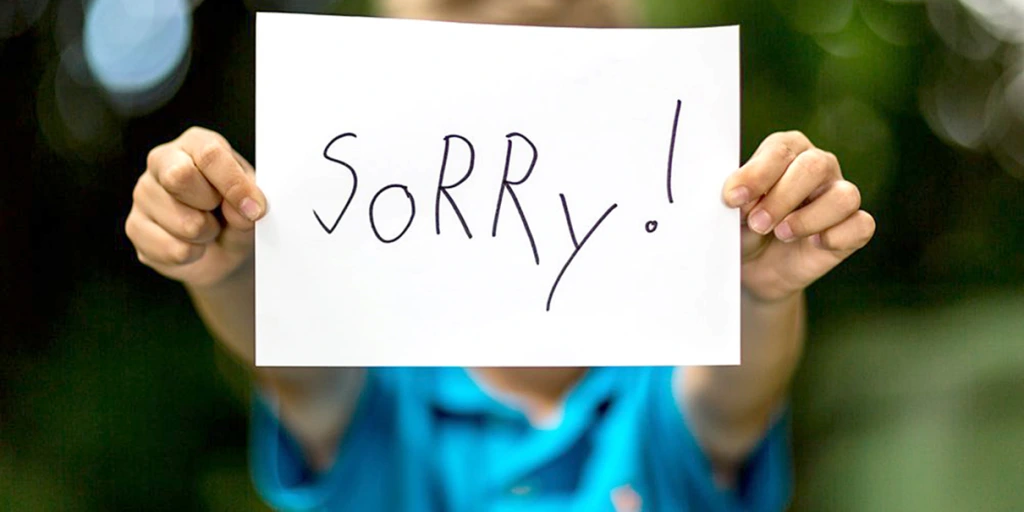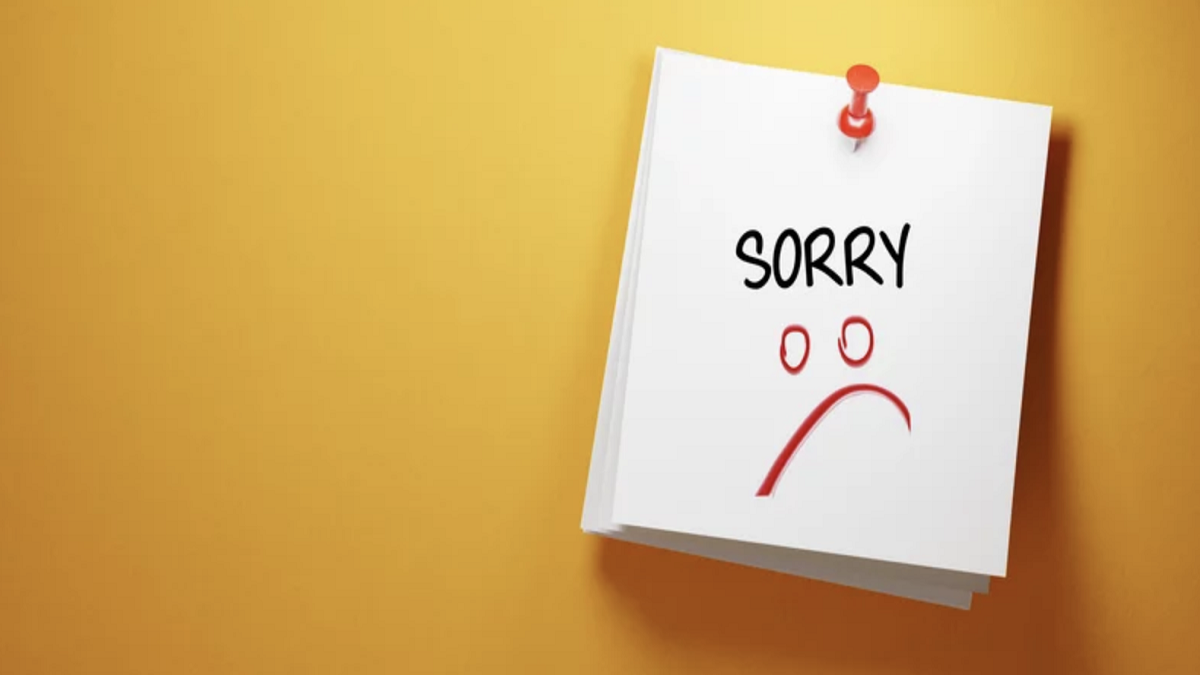How many times today have you apologized? The answer is most likely a lot if you’re like most people. Feeling sorry entails “remorse, compunction, sympathy, pity, etc.” We don’t always utilize it that way and fail to find ways to stop saying sorry, which is the main issue. People now use “sorry” as a type of anchor for various expressions, whether they’re requesting assistance, asking a question, or just moving about in a congested area.
Why are we apologizing in such situations when we aren’t experiencing remorse or sympathy? According to research, women are more likely than men to over-apologize, but psychologists warn that constantly repeating “I’m sorry” may damage your authority and potentially lower your self-esteem. It’s time to change things up if you continuously apologize too much. Here are some strategies to start expressing your true feelings instead of apologizing.
Tips To Stop Over-Apologizing

1. Observe Yourself In The Act
Recognizing when and why you apologize is one of the ways to stop saying sorry. Many of us find ourselves saying “sorry” even when we haven’t done anything wrong, simply out of a sense of discomfort or a desire to be polite. It’s common to feel like you’re in the way of others or that your presence or questions in meetings might be unwelcome. These feelings often lead to unnecessary apologies.
However, it’s essential to become more aware of these moments and assess whether an apology is truly needed. One way to become more mindful is to track every time you say “sorry” during the day. Keep a simple tally or note whenever you apologize without cause.
Alternatively, you could ask a trusted friend or coworker to help you identify these moments, offering gentle reminders when you over-apologize. This practice helps to break the cycle of unnecessary apologizing and fosters more confidence in your interactions.
2. Consider Your Reasons For Apologizing
Has the word “sorry” become a cliché in your vocabulary? In many situations, it’s no longer a genuine expression of regret but rather a habitual response. For some, saying “sorry” is a way to cope with anxiety or insecurity, often as a filler when they feel uncertain or don’t know what else to say.
It can also arise from a lack of confidence, where apologizing seems like a way to ease tension or avoid confrontation, even when it’s unnecessary. Understanding the underlying reasons for your frequent apologies is key to breaking this pattern.
By recognizing when you’re apologizing out of habit or discomfort rather than genuine remorse, you can begin to explore other ways to communicate. Experimenting with alternative words or phrases, such as “Excuse me” or “Pardon me,” can help you find more appropriate responses in different situations, fostering more effective and confident communication.
3. React With Deeds Rather Than Words
Don’t undermine your worth by defaulting to apologies, especially when it comes to professional situations. Instead of expressing guilt or self-criticism, show care and gratitude. For example, if a project is behind schedule, refrain from saying, “I’m so sorry I don’t have this to you yet,” as it perpetuates a narrative of inadequacy.
Instead, you could say, “Thank you for your patience as we navigate this project; you will have it by Friday of next week.” This not only demonstrates appreciation but also sets clear expectations and maintains your professionalism.
By choosing to take responsibility for the situation in a positive light, you reclaim your power and authority. Know how to stop saying sorry and instead shift the focus to solutions and gratitude. Saying “thank you” acknowledges the other person’s understanding while also demonstrating confidence and control over your circumstances.
4. Discuss The Resolution You Would Want To See Come To Pass
The phrase “I’m sorry” can often become a meaningless, overused statement that fails to convey true sincerity or lead to resolution. An effective alternative to this phrase is “I desire.” This expression shifts the focus from regret to intention and clearly articulates what both parties hope to achieve.
By using “I desire,” you open the conversation to a more positive, solution-oriented direction. It not only reveals your intentions but also helps the listener understand your perspective and feel acknowledged.
For example, instead of apologizing for an unmet expectation, you could say, “I desire for us to find a way to meet the deadline,” which shows that you’re focused on moving forward and working together to resolve the situation. This simple shift fosters clarity and encourages collaboration, empowering both the speaker and the listener to take actionable steps toward a resolution without lingering in unnecessary apologies.
5. Stop Using Sorry In Your Emails
In face-to-face interactions, it’s easy to unintentionally say “sorry,” often without realizing it. However, when you’re communicating via email, you have the advantage of time to thoughtfully consider your words and know ways to stop saying sorry. This allows you to eliminate unnecessary apologies and replace them with more confident, proactive language.
After composing your email, take a moment to review it and identify any instances of the word “sorry” or other passive expressions. Instead of apologizing for things that aren’t your fault, try substituting those words with alternatives that convey clarity and assertiveness.
For example, replace “I’m sorry for the delay” with “Thank you for your patience.” This small shift can make a significant difference in how your message is perceived, helping you come across as more confident and decisive. Removing over-apologizing from your written communication not only strengthens your tone but also enhances your professional image.
6. Don’t Say Sorry for “Bothering” Others
One of the most common instances of over-apologizing happens when we want to ask a question or share an opinion during a meeting or casual conversation. Often, we apologize before even speaking, saying something like, “I’m sorry to interrupt,” or “Sorry, but I have a question,” which undermines our confidence and value. Instead, take a more direct approach.
For example, if you knock on your boss’s door, you can simply ask, “Is now a good time for a quick question?” After their response, express your opinion or inquiry clearly and respectfully when there’s a natural pause in the conversation.
If your question or opinion will help you do your job better, don’t be afraid to voice it. It’s important to remember that your input is valuable and that asking questions or sharing thoughts is a crucial part of professional communication. Eliminating unnecessary apologies fosters confidence and encourages more open, productive discussions.
7. Be Empathetic Rather Than Pathetic
When something unfortunate happens to someone else, the word “sorry” is often used, but it isn’t always the most appropriate response. Saying “sorry” can sometimes express pity, focusing more on the speaker’s feelings than on the experience of the person who is suffering.
It can also come across as inauthentic, especially when it’s used too frequently without much thought or genuine empathy. Instead of defaulting to “sorry,” try to show deeper empathy by prioritizing the emotions and needs of the other person. For example, you could say, “I can’t imagine how difficult this must be for you,” or “I’m here if you need anything,” which acknowledges their pain in figuring out how to stop saying sorry.
This type of response shows that you are truly listening and that you care about their well-being, rather than simply offering a generic or overused apology. Demonstrating empathy in this way strengthens connections and provides more meaningful comfort.
8. React With Assurance To Perceived Failures And Make A Commitment To Fixing Them
Apologies do have a place, even in the workplace, but they should be reserved for situations where you have personally or emotionally harmed someone. Simply saying “sorry” in response to a challenge or setback may not be the most effective approach. Instead, it’s more empowering to acknowledge the situation and focus on the next steps.
For example, if a project didn’t go as planned, confidently state, “That didn’t go as well as planned, but I’ve got this.” This shows that you take ownership of the situation without letting it define you or undermine your confidence. After expressing this, take proactive measures to address the issue.
Reflect on what went wrong, acquire the necessary tools or skills, and dedicate yourself to overcoming the challenge. This mindset shifts the focus from regret to growth, encouraging resilience and a solution-oriented attitude. It helps you move forward with a clear plan to complete the task successfully.
9. Before Having A Crucial Talk, Prepare
If you recognize that you tend to over-apologize during difficult encounters, it can be helpful to practice alternative phrases ahead of time. Anticipating the conversation allows you to plan your words thoughtfully and avoid falling into the habit of excessive apologizing.
For example, if you need to discuss an issue with your employer, think about how the conversation might unfold and select a few alternative phrases to use instead of saying “sorry” repeatedly. You could prepare statements like, “I’d like to discuss a challenge I’m facing,” or “Here’s an update on the situation and how I plan to move forward.”
By preparing your remarks in advance, you’ll find it easier to recall these alternative expressions when the time comes. This preparation helps keep the conversation focused on solutions and responsibility, rather than allowing it to be derailed by unnecessary apologies. Over time, incorporating these alternatives will become more natural and confident. You can also read our other post about relationships here.
Why People Keep Saying Sorry
The word “sorry” is often used as a reflexive response in various situations, but why do people keep saying it, even when it’s not necessary? Over-apologizing has become so ingrained in daily communication that it’s easy to forget the true purpose of the word.
One reason people say sorry frequently is due to social conditioning. From a young age, we’re taught to apologize for our mistakes or when we inconvenience others. This habit continues into adulthood, even when the situation doesn’t necessarily warrant an apology. Over time, saying “sorry” becomes a default expression for many, used as a way to maintain politeness or to avoid conflict.
Another factor is self-doubt or insecurity. When we feel uncertain about our actions or interactions, apologizing may serve as a coping mechanism. By apologizing, we attempt to soften a situation, signaling to others that we are aware of potential mistakes or discomfort.
Finally, “sorry” is sometimes used as a filler word, especially in emails, phone calls, or quick conversations. People use it to buy time or soften their words, especially when they feel uncomfortable or unsure how to respond.
In conclusion, while apologizing can be important when you’ve truly done something wrong, over-apologizing can diminish your confidence and make interactions feel less genuine, and you should find ways to stop saying sorry. Being mindful of when and why you apologize can help foster clearer, more confident communication.
FAQ
Q: What can I say in place of “I’m sorry”?
A: “I admit my error,” expressing “I acknowledge my mistake,” is a better way to own up to your mistakes than just expressing “sorry.” This shows responsibility and a readiness to grow from mistakes. It may assist you in regaining the confidence of people and is a more responsible and adult approach to handling the matter.
Q: Why not just say “I’m sorry”?
A: Although the standard response is “I’m sorry,” there are alternative, more effective ways to express regret. “I beg your pardon” and “My apologies” are examples of formal apologies. A few examples of informal apologies include “My bad” and “Oops.” The key to adequately apologizing, whether in a professional or casual setting, is selecting the appropriate words.
Q: What is the method for apologizing?
A: People use apology tactics, such as expressing regret and offering recompense, to carry out the spoken act of apologizing.











